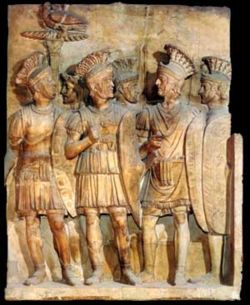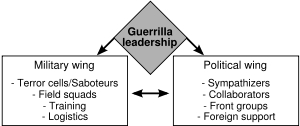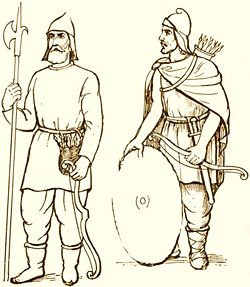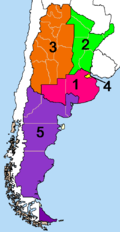Military
Military has two broad meanings. In its first sense, it refers to soldiers who represent their country and constitution. In its second sense, it refers to armed forces as a whole. Over the years, military units have come in all shapes and sizes. more...
They have been as small as a handful of medieval peasants banded together for battle under their feudal lord or as large as the invasion force created in 1944 for D-Day. They can be as rigidly organized as the impis of Shaka Zulu or virtually autonomous like the Knights Templar during the Crusades. Some states—for instance, Sparta or more recently Prussia—have even placed military prowess at the heart of government.
The business of soldiering is older than recorded history itself. Some of the most enduring images of the classical world portray the power and feats of antiquity's military leaders. The Battle of Kadesh in 1274 BC was one of the defining points of Pharaoh Ramesses II's reign and is celebrated in bas-relief on his monuments. A thousand years later the first emperor of unified China, Qin Shi Huang, was so determined to impress the gods with his military might that he was buried with an army of terracotta soldiers. The Romans were keen on military matters, leaving to posterity many treatises and writings as well as a large number of lavishly carved triumphal arches and columns celebrating their victories.
In our own era world wars and countless other major conflicts have changed the political landscape beyond recognition. Empires have come and gone; states have grown and expired. Enormous social changes have been wrought and military power continues to dominate international politics. The role of the military today is as central to society as it ever was.
Etymology and some definitions
The first recorded use of military in English, spelled militarie, was in 1585. It comes from the Latin militaris (from Latin miles meaning "soldier"—that is someone skilled in arms, engaged in military service or in warfare).
As an adjective military originally applied only to soldiers and soldiering, but it soon broadened to apply to land forces in general and anything to do with their business. The names of both the Royal Military Academy (1741) and United States Military Academy (1802) reflect this. However, about this time it started to be applied to armed forces as a whole and nowadays expressions like "military service", "military intelligence" and "military history" reflect this broader meaning.
Read more at Wikipedia.org




